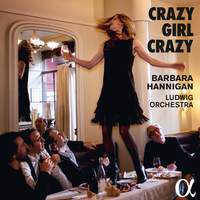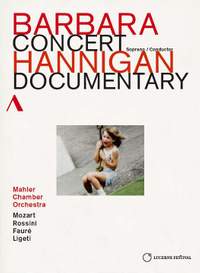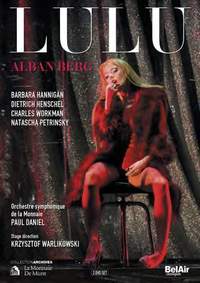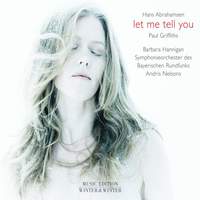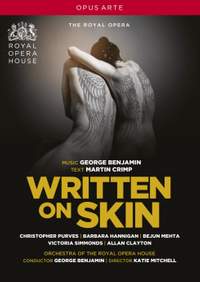Interview,
Barbara Hannigan on Crazy Girl Crazy
 The fearless Canadian soprano Barbara Hannigan has made something of a speciality of playing what one broadsheet critic recently referred somewhat dismissively as 'dotty women', creating psychologically complex contemporary operatic roles such as Hans Abrahamsen's and Brett Dean's depictions of Ophelia, and Agnés in George Benjamin's Written on Skin. Her debut recording on Alpha (which sees her conducting the Ludwig Orchestra at the same time as navigating some serious vocal pyrotechnics!) focuses on another of her signature-roles, Berg's chameleonic Lulu, juxtaposing the suite from the opera with music by Berio and Gershwin to offer new perspectives on the 'crazy girl' stereotype with which she's become associated.
The fearless Canadian soprano Barbara Hannigan has made something of a speciality of playing what one broadsheet critic recently referred somewhat dismissively as 'dotty women', creating psychologically complex contemporary operatic roles such as Hans Abrahamsen's and Brett Dean's depictions of Ophelia, and Agnés in George Benjamin's Written on Skin. Her debut recording on Alpha (which sees her conducting the Ludwig Orchestra at the same time as navigating some serious vocal pyrotechnics!) focuses on another of her signature-roles, Berg's chameleonic Lulu, juxtaposing the suite from the opera with music by Berio and Gershwin to offer new perspectives on the 'crazy girl' stereotype with which she's become associated.
I spoke to Barbara the morning after the opening night of Debussy's Pélleas et Mélisande (a production which sees her navigating Debussy's sinuous vocal lines whilst dancing en pointe!) to learn more about the concept behind this fascinating and eclectic album, and how she negotiates the physical and mental demands of conducting and singing simultaneously…
It’s not very often that we see Gershwin, Berg and Berio together on the same CD! What connections do you see between the three pieces, and how did the programme evolve?
It’s all built around Lulu: this incredible woman who has such incomparable self-knowledge and instinct, which makes everyone around her go crazy because they’re confronted with their own shortcomings compared to her. The central piece of course is the Lulu-Suite, using material from the second and third acts of the opera (from the moment before she kills Doctor Schön till after her death), and there are many different stories even within the Suite itself: not only do we see Lulu herself through different prisms, but also the people around her. Then comes the Gershwin: as the Berg is composed using the mirror technique, I took the Gershwin and made it as a kind of mirror for Lulu and also for the Countess Geschwitz. Just as the Lulu-Suite ends with Geschwitz singing about her own loneliness and the fact that she didn’t get the girl, we start [the Gershwin] with the same person singing the same words, the same story, with exactly the same orchestration - but at a very different temperature!
For me this whole period of artistic development in the world between the Wars, especially the 1920s leading into the 1930s, was so fertile: as I mention in the liner-notes, Berg and Gershwin met and played their own music for each other in 1928, which would have been when Berg was already writing Lulu and Gershwin was about to begin writing Girl Crazy. They were great admirers of each other, and for me it’s not just a connection of time, it’s also a connection of two artistic souls: both died young, both were exploring beyond the dictates of music at the time.
And then we have the Berio Sequenza, which for me is Lulu at 15 years old. The text is: ‘Give me a few words for a woman to sing/Allowing us to build a house without worrying before night comes.’ For me, it’s directly related to the moment in the third act of the opera when Lulu is telling the Marquis that when she was 15 years old (and already living with Doctor Schön) she had ‘the good fortune’ to go into hospital for a couple of months, and during those couple of months she was away from the eyes of men and learned to know who she was. It’s all pretty creepy, but it set off so many trains of thought for me: why did she go into the hospital for several months? Why did she call it ‘good fortune’? Who was she before she knew herself?. And that’s how I’m playing Sequenza III: as the pre-Lulu, the one that’s about to go into the hospital, that didn’t have a home or a voice, and wanted to stop worrying and just live. In a way it’s a little strange to put a solo voice piece on a CD with big orchestral pieces, but I really wanted to tell that dramaturgical story.
I don’t think of the Sequenza as a piece of madness, not at all. In fact I had a very clear motivation in choosing the word ‘Crazy’ for the project, because I think it can so often be applied in a rather blasé way, especially to women. So I wanted to take it and use it in a positive way: to be crazy about something, to be driven crazy by something so powerful that it’s beyond us, like love or jealousy.
You often collaborate closely with living composers (in fact when I spoke to Hans Abrahamsen last year about Let me tell you, he said you single-handedly taught him how to write for the voice!) – how closely did you work with Bill Elliott on the Gershwin Suite?
Super-close! It was such wonderful serendipity to be introduced to him and then to just click in the way that we did. Bill writes a lot not only for Broadway but also for the Boston Pops, so I asked if he would be interested in me commissioning him. We first met up in Boston just to choose the songs and the order of the songs, and I explained that it would be recorded and performed in companion with the Lulu-Suite and needed to have the same orchestration. Next I started introducing him to Berg because he didn’t know Lulu so well - I wanted him to understand the tone-rows and the architectural devices of composition that Berg had used in Lulu because I wanted there to be a connection. This was in February 2016, then that summer when I was in Aix-en-Provence he started emailing me drafts of just a piano score, and I would take the first draft and re-arrange: we’d have long sessions on Skype where I would sit at the piano and play and sing things to him, and I would take pictures of what I’d written and he would do the same. We were real collaborators and co-arrangers.
Eventually we had something that was referential but also very personal: it was him, it was also me and characters I’ve played (and not just the Berg - it has quite strong connections with Ligeti and Boulez), and then Bill orchestrated it. He came to the first orchestral rehearsals last summer in Lucerne, and even then we were changing things, reallocating solos, adding more ‘candy’ as he would say, with percussion, particularly glockenspiel. What I love about working with Bill is that because he’s an arranger he really is à la minute, cooking on the spot. Most composers I work with don’t make any changes – by the time it gets to the performers, it’s done!
The other interesting thing about the Gershwin suite is that it’s the first piece ever composed for a singer who is also conducting. There are very rhythmic sections that you absolutely have to turn round and simply conduct (for instance ‘Strike Up The Band’, in the second movement), and then other passages are written in such a way that he knew I wouldn’t be conducting. It’s like a cross between a big band composition and a modern music composition - and in that way it’s like Lulu, which has all these jazz-band elements alongside the tone-rows.
Conducting whilst singing seems to be something that an increasing number of musicians are trying on these days, particularly in baroque music – what are the challenges and the rewards for you, from a purely technical point of view? How do you make the vocal production and physicality work?
Back in the days when I did a lot of Handel and Vivaldi concerts, I found it was often really unnecessary to have a conductor when you have a group of really fine musicians - what you need are leaders who are completely present during rehearsal, so that we have the dramaturgy of how we want to play this music for this particular performance, and that work takes place in the rehearsal-room. But these days I’m doing pieces as a conductor that are for very large orchestra (things like Berg’s Lulu-Suite, or Stravinsky’s Symphony in Three Movements, or Sibelius's Luonnotar), and with music like that you really have to conduct rather than lead, there’s no question.
The serious conducting has been going on for about six or seven years for me (I started at the Châtelet in Paris) and it does present certain challenges, not least what it does to your neck and shoulders: every conductor I know goes to a very specific massage therapist! But if you have that tension and you’re still trying to sing at the same time…well, after four or five days of rehearsal you’re in trouble, unless you’re extremely careful and conscious of how you train and use the body. It’s the rehearsals that do you in, not the performances: conducting, explaining, talking to the orchestra, it’s all of those things which can take a toll on the instrument.
For the first couple of years it was incredibly hard and now it’s less difficult – but it’s always going to be challenging and exhausting! I was reading an interview with Esa-Pekka Salonen the other day where he said that when he comes back to conducting after taking a few months off just to compose, he can barely walk or function after the first day back! It’s so exhausting on your system to be in front of the energy of 80 or 100 people, trying to tame and shape and sculpt that energy and that sound - it's a completely different experience to being a soloist.
This recording is the first of your new partnership with Alpha: what attracted you to the label?
I looked at all the other albums they are making and have made, and knew it would be a perfect marriage! What I love about Alpha is that they’re game for anything – they’re risky, and that really connects with me because I like to do off-the-wall wild-card stuff. I’m not a young singer who’s been put into a box and told ‘This is how we want to present you’, and I don’t want to do the sort of conventional album of arias that many other labels would want me to do: I could never be constrained in that way. The world is not waiting for another disc of standard operatic arias from me, and I’m not waiting to do it – it has to be a very personal expression of the music that I feel needs to be championed or presented in a particular way.
The new album is a CD/DVD package, including a film by Mathieu Amalric called Music is Music: it’s just been selected for the New York Film Festival, which takes place just a few weeks after the album comes out. It’s a very beautiful, special, intimate film about the way the orchestra and I work together and also about the various aspects of how I’m using my voice and musicality.
Crazy Girl Crazy: Music by Gershwin, Berg and Berio
Barbara Hannigan (soprano/conductor), Ludwig Orchestra
Crazy Girl Crazy is released on Alpha on 22nd September.
Available Formats: CD + DVD Video, MP3, FLAC, Hi-Res FLAC
Related recordings from Barbara Hannigan
Barbara Hannigan (soprano/conductor), Mahler Chamber Orchestra
Available Format: DVD Video
Barbara Hannigan (Lulu), Natascha Petrinsky (Geschwitz), Tom Randle (Maler & Neger), Dietrich Henschel (Dr. Schön/Jack the Ripper), Charles Workman (Alwa); Orchestre symphonique de la Monnaie, Paul Daniel, Krzysztof Warlikowski (dir.)
Available Format: 2 DVD Videos
Barbara Hannigan (soprano), Symphonieorchester des Bayerischen Rundfunks, Andris Nelsons
Available Formats: CD, MP3, FLAC, Hi-Res FLAC
Christopher Purves (Protector), Barbara Hannigan (Agnès), Bejun Mehta (First Angel/Boy), Victoria Simmonds (Second Angel/Marie) & Allan Clayton (Third Angel/John); Royal Opera Chorus & Orchestra of the Royal Opera House, George Benjamin (conductor) & Katie Mitchell (dir.)
Available Format: DVD Video


